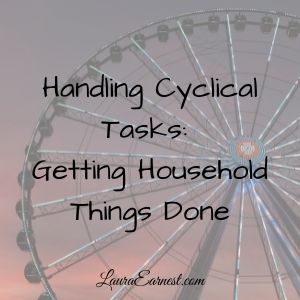It’s often said that out of sight is out of mind. At the same time, things ignored pile up and can get out of hand. Getting Household Things Done really has two parts: the items that process through the system, and the items that reoccur. Today we will look at how to handle those cyclical tasks within a framework of Getting Household Things Done.
The problem with housework is that it is not once and done. Cleaning tasks have to be repeated because things get dirty. And you can’t do them ahead of time…tuning a piano twice in one week does no good, and doesn’t make the piano in tune six months later.
The tasks for maintaining a household, when written down, can be overwhelming. If you don’t write them down, you can forget them. If you don’t manage the timing, they can suck up all your free time.
I’ve spent a good portion of my adult life trying to make a working system where I’m not overwhelmed by household maintenance, and where I don’t spend large amounts of time at a stretch doing those tasks. I tried printed lists, apps, systems other people designed, cleaning only on weekends, cleaning only on weekdays, ignoring things until they really needed cleaning, cleaning before things looked dirty and more. All it did was make me exhausted, stressed and resentful.
It’s only been in the last five years that I have taken everything I have learned and put together my own management system. And I will show you how to manage those tasks today so that you can do the same.
Before you can embark on managing your cyclical tasks, you need to have your tasks defined. If you need some help with that, please check out my Custom Chore Grid, which allows you to define your rooms, your tasks, and your frequency.
Methods of Tracking Cyclical tasks
You can manage these household cyclical tasks fairly easily in a number of ways.
Printed List
You can manage your cyclical on paper. Whether a list that splits things up by week or month, or a grid that allows you to see your tasks due, both are equally suited to the paper method.
Pros: It is easy to put something on paper. It requires no special materials and can be changed as needed.
Cons: If you don’t routinely look at your paper, you won’t remember to do the tasks. Out of sight, out of mind.
Electronic List
An electronic list fits in well with how most people manage their tasks.
Pros: Most task managers can import tasks, making it easy to get into the system. You can also assign repeats to tasks easily.
Cons: Too many tasks mixed in with your day-to-day systems will overwhelm it and can cause procrastination on everything because you can’t see what is truly important.
Getting the Cyclical Tasks Done
No matter how you store the tasks, it will still be up to you to get them done. There are a couple of techniques I have learned that seem to work for me, and might work for you.
Have a set time each day. I have a set time to deal with household tasks every day. My schedule might not allow me to do them, but the time is blocked out for the days when I can. Once I am in that block, I pick tasks from my list and do them. This prevents me having to give up large chunks of my weekend to clean.
Track the streaks. I have found that tracking how often I do a task is a big motivation in doing more. My requirement for my household tasks is that I have to do something from my list. It may be only one task, and it may be really easy, but it has to be on the list. I find that tracking this streak allows me to stay on top of the tasks I had previously decided to do during the week.
The End Result
Managing these cyclical household tasks has made my weeks less stressful, my weekends free of housework, and my home cleaner and more organized.
Want to know more? Check out the other articles about Getting Household Things Done: Getting Household Things Done, Inputs: Getting Household Things Done, How to Handle Children’s Papers, Mission Control Setup, Mission Control In Action and How to Control Owner’s Manual







